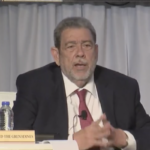The planned cashless payment system for privately run public service vehicles (PSVs) has run into a roadblock owing to concerns over the cost of hardware, the operators’ representatives have revealed.
Roy Raphael, chairman of the Alliance Owners of Public Transport (AOPT), said the programme was unable to proceed as planned due to cost constraints discouraging several owners from participating.
“We are on halt as it relates to moving in the direction that we want to move, because, right now, the cost of the readers that read the cards is very expensive, and some persons are not interested in going that route because of the costs,” Raphael told Barbados TODAY.
“The cost could go up between $1 000 and $2 000 per unit, and that is one of the areas where we have the setback now. We would have been in discussion with the Ministry of Transport and Works, the deputy prime minister, if they could amend the law to allow us to use the hand-held…such as the cellphones because we would use things like QR codes to make it easier for persons. But we have not heard from them and that is the whole setback.”
The AOPT head said a pilot of the system using ten vehicles must first be undertaken, but that some operators are not comfortable about going on the route with a mobile phone as an alternative device to the more expensive reader, without the approval of authorities, for fear of being reported by police.
The owners are therefore weighing their options in the meantime.
“It (cashless system) is on hold because of the fact that we could try to get these minor issues ironed out,” Raphael stressed. “But once that is ironed out, we should be ready to go because all systems are in place. It is just that these minor issues that really confronted us as to how we need to move forward. But the majority of our members are very much interested in going the route of the cashless system because of the amount of cash being placed on public service vehicles, it is really a major headache for us and it also puts persons at risk.”
Raphael said that after the pilot project is completed, the association is hoping to get the Transport Board to collaborate with the PSVs in order to “have one system, rather than two separate ones”.
He said once things are in place, training will begin involving the ten vans.
Chairman of the Association of Public Transport Operators (APTO) Anwar Nana also complained that one of the providers of the hardware “has a fairly high cost for the reader, the device that goes into the actual vehicle”.
“But at this time,” Nana told Barbados TODAY, “we are still looking at providers, so, that right now it is not an issue because there are different ways of going around it…you can use a mobile phone, you can use a tablet. So, we are looking at providers that can do that.”
The association head disclosed that they are currently in negotiations with providers for these devices.
“So, we are looking at the best options, so there is nothing concrete at this moment. So, we are looking [that] within another couple of weeks to have something concrete and maybe in another month… two months or so, start on a pilot programme across Barbados,” the PSV association chair disclosed.
He added: “What we definitely need is the assistance of the government in having it legislated, so that there will be no cash on public service vehicles, be it Transport Board, PSVs, minibus, ZRs, [and] TAP [Transport Augmentation Programme]. Everything would go through a cashless system, and that would be of great assistance, including security and everything else.”
Permanent Secretary of the Ministry of Transport Andrew Gittens pointed out that while he was present during discussions with the PSV bodies who raised the issue of the cashless system, no proposals have reached him for amendments to the law that would permit the use of mobile phones as a means of facilitating cashless payments.
“If a proposal is made, it would have to be examined and then if it is found feasible, then we will take the necessary actions. If they are saying it is a requirement for amendment to the legislation, then they will make the request, it will be examined, and based on the advice, if it is something that is considered in the best interest of the country, the transport sector, then we would have to get Cabinet approval and then the legislation drafted,” Gittens told Barbados TODAY.
emmanueljoseph@barbadostoday.bb
The post PSV operators seek cheaper tech as fare payment system hits cost barrier appeared first on Barbados Today.


